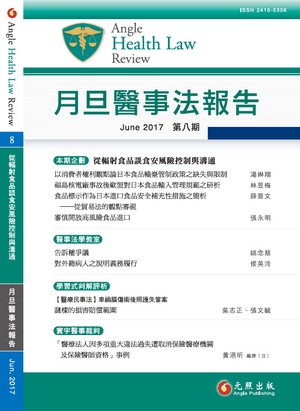以消費者權利觀點論日本食品輸臺管制政策之缺失與限制【本期企劃】 試閱
On the Defects and Limits of Japanese Food Import Control Policy in Terms of Consumer Rights
從福島核災發生至今,日本食品輸臺管制政策的主要根據一直是以縣級行政區作為基準,規範要求福島、茨城、櫪木、群馬、千葉等五縣所生產所有食品都禁止輸臺。然而從消費者的觀點出發,這套管制政策是否真的能夠回應民眾對於食品安全的憂慮,不無疑問。本文以長期收集之消費者對日本食品輸臺管制政策的疑懼為基礎,根據消費者權利中求取安全之權利、了解事實真相之權利,以及選擇之權利分別說明民眾認為當前日本食品輸臺管制政策尚有不足之處。本文最後回應管制政策是否應對此一問題有所調整,認為現有的管制政策仍有其缺失,確有調整之必要;但消費者的憂慮亦並非僅是透過調整管制政策即可消解,政府在風險溝通以及風險管理上都有諸多值得努力的空間。
Since Fukushima nuclear disaster has occurred, the countylevel administrative region has been the main standard of Japanese food import control policy, all kind of food produced in Fukushima, Ibaraki, Tochigi, Gunma and Chiba counties are prohibited imports. However, from the consumer’s point of view, does the policy really respond to public concerns about food safety? This article based on the long-term collection of consumer opinions with mistrust and fear on import control policy. On the view of three kinds of consumer rights─the right to safety, the right to be informed and the right to choose, there are still defects and limits in the import control policy. Finally, the existing import control policy has its flaws, and it should be adjusted. But consumers’ worries can’t be solved through just adjusting import control policy. The government should put more effort on performing more sophisticated and advanced risk communication and risk management in this case.
009-019






